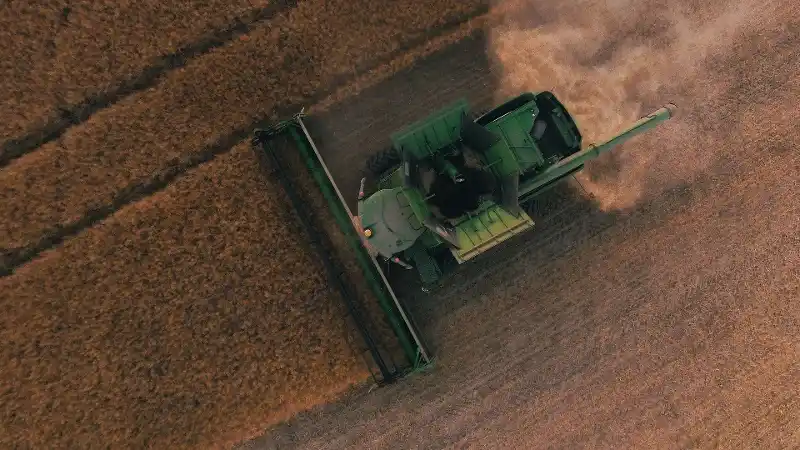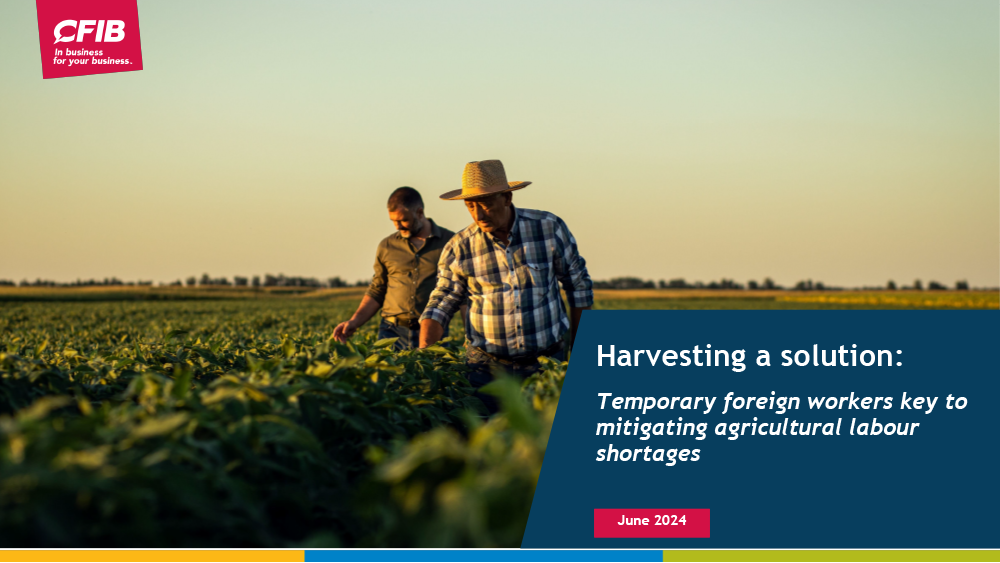Get Growing Your Business
Small Business Support:
Agri-Business and Farms
Running a small business comes with its challenges, especially within the agricultural sector, but you don't have to face it alone!
Our team of experienced business advisors are here to guide you through everything from hiring staff, to understanding CRA obligations, to navigating workers' compensation, and so much more. We'll even help you navigate employment issues and regulations, so that you can concentrate on growing your business, while minimizing any potential risks!
Running an agri-business can be challenging. We make it easier!

Lifetime Capital Gains Exemption
What You Need to Know:
The Lifetime Capital Gains Exemption (LCGE) allows farm owners to reduce taxable capital gains when selling qualified farm property, providing significant tax savings.
How It Affects Your Farm:
By utilizing the LCGE, you can keep more profits from the sale of your farm, making it easier to preserve wealth, support succession planning, and pass your farm on to the next generation.

Stay Informed, Stay Ahead!
Join us today to ensure you're not missing out on any vital resources that can propel your agri business forward. Sign up now to receive our quarterly Agricultural and Farming newsletter directly in your inbox! Receive first-hand access to exclusive updates and resources tailored just for your agri business or farm.
Have Your Voice Heard!
What our members are saying about issues impacting agriculture and farming.
Share Your Voice: Agri-Business Challenges
Have thoughts or concerns about the issues impacting your agri-business? We'd love to hear from you.
Share your insights or learn more about how CFIB can support your business by filling out our form. Together, we can make your voice heard!
Additional Opportunities to Save:
Elite Agri Solutions offers a comprehensive range of agricultural safety services, with convenient online training options as well as expert in-person sessions tailored to suit your needs.
Take advantage of exclusive savings and discounts available to agricultural producers, such as the Agricultural Switch Incentive Program.
Exclusive site-wide savings on a large selection of quality workwear, including flame-resistant and high-visibility apparel, safety footwear, outerwear and more.
Stay connected to get the latest in agriculture with Ontario Farmer, a trusted weekly newspaper for farmers across the country.
Payworks helps manage your workforce by providing cloud-based solutions for Payroll, Human Resources, Employee Time and Absence Management.
CFIB members save big on Enterprise car rentals with thousands of locations to choose from, flexible plans, and easy booking.
Report: Harvesting a Solution
Temporary foreign workers key to mitigating agricultural labour shortages.
Agri-businesses in Canada face persistent labour shortages. In 2022, labour shortages in agriculture amounted to $2.8 billion in lost contracts or sales, thereby limiting sales and production growth. The problem is not going away with estimates from the Canadian Agricultural Human Resource Council suggesting there will be 100,000 vacant jobs in the agriculture sector by 2030.

The agriculture sector is fundamental to the Canadian economy!
The agriculture sector is fundamental to the Canadian economy and plays a crucial role in meeting both local and global food demands. In 2023, the sector contributed $40 billion to the GDP, representing 2% of the national total, and employed over 300,000 individuals. Renowned for its diverse, high-quality products, Canada is a leading global exporter with $92.8 billion in agricultural and processed food exports.
Source: CFIB Harvesting a solution: Temporary foreign workers key to mitigating agricultural labour shortages report.
Small and mid-sized businesses (SMEs, 1 to 499 employees) account for about 95% of the agricultural sector GDP, make up the majority of businesses (99.9%), and employ 90% of the workforce in that sector.
Source: CFIB Harvesting a solution: Temporary foreign workers key to mitigating agricultural labour shortages report.
Foreign workers have been instrumental in bridging labour shortages. In 2023, 3 in 10 agri-businesses hired foreign workers (51% in Quebec) and 26% indicated that they plan to hire more Temporary Foreign Workers in 2024.
Source: CFIB Harvesting a solution: Temporary foreign workers key to mitigating agricultural labour shortages report.
Webinars
PLACEHOLDER: A sentence or two introducing webinars and their importance for ag.
Frequently Asked Questions for Agriculture Small Business
What are some common sources of government funding for agri- businesses?
Some common sources of government funding include:
- Grants: Non-repayable funds provided by government agencies or organizations to support specific agricultural initiatives such as research and development, innovation, sustainability, and market expansion.
- Loans: Low-interest loans offered by government-backed programs to assist agriculture businesses with financing for expansion, equipment purchases, infrastructure development, and other operational needs.
- Subsidies: Financial assistance provided to agriculture businesses to offset production costs, promote certain agricultural practices, or support farmers during challenging economic conditions.
- Tax Incentives: Tax credits or deductions offered by governments to encourage investment in agriculture, including incentives for renewable energy production, conservation practices, and rural development.
Some resources for funding:
How do I apply for government funding for my agriculture small business?
Here are some tips to apply for provincial or federal government funding for your agri-business:
- Research available government grants and programs specific to agriculture in your region or country.
- Review the eligibility criteria and requirements for each funding opportunity to ensure your business qualifies.
- Prepare a thorough business plan outlining your agricultural venture, including details on your products or services, target market, financial projections, and how the funding will be utilized.
- Complete the application process as per the instructions provided by the respective government agency or organization offering the funding.
- Submit your application within the specified deadline and await notification regarding the status of your application.
What documentation is typically required when applying for government funding?
Documentation requirements may vary depending on the specific funding program, but common documents requested may include:
- Business Plan: A detailed outline of your agriculture business, including information on your products or services, target market, marketing strategy, financial projections, and management team.
- Financial Statements: Current financial statements, including balance sheets, income statements, and cash flow statements, to demonstrate the financial health and viability of your business.
- Tax Returns: Copies of your business and personal tax returns for the past few years to verify your financial history and compliance with tax obligations.
- Legal Entity Documents: Documentation proving the legal structure of your business, such as articles of incorporation, partnership agreements, or operating agreements.
- Permits and Licenses: Copies of any required permits, licenses, or certifications needed to operate your agri-business legally in your jurisdiction.
How can I improve my chances of securing government funding for my agri-business?
While there is no guarantee that these tips will increase your chances of securing government funding for your agri-business, consider the following:
- Research Funding Opportunities: Stay informed about available grants, loans, and other funding programs relevant to the agriculture sector, and target those that align with your business goals and objectives.
- Develop a Strong Business Plan: Create a comprehensive business plan that clearly outlines your agriculture business concept, market potential, competitive advantage, and financial projections, demonstrating the viability and potential impact of your venture.
- Seek Professional Assistance: Consider seeking assistance from professional advisors, such as accountants, lawyers, or business consultants, who can help you navigate the complexities of applying for government funding, ensuring compliance with requirements, and optimizing your application for success.
What are some alternative sources of funding for agri-businesses if government funding is not available?
If the funding is not available or insufficient for your agri-business through government you may wish to explore alternative sources of funding, including:
- Private Investors: Seek investment from angel investors, venture capitalists, or private equity firms interested in supporting agriculture startups and emerging businesses.
- Crowdfunding: Launch a crowdfunding campaign on platforms such as Kickstarter, or GoFundMe to raise funds from individual backers who believe in your agriculture business idea.
- Bank Loans: Apply for traditional bank loans or lines of credit to secure financing for your agriculture business, leveraging your business assets or personal collateral to qualify for funding.
- Community Grants and Foundations: Research grants and funding opportunities offered by local community organizations, foundations, or nonprofits that support agriculture, rural development, or environmental conservation initiatives.
- Supplier Credit: Negotiate favorable payment terms with your suppliers or vendors to access goods and services on credit, allowing you to conserve cash flow and reinvest in your agriculture business operations.
What are some common challenges faced by agri-businesses when applying for government funding?
Some common challenges faced by agriculture small businesses when applying for government funding include:
- Complex Application Processes: Government funding applications often involve extensive paperwork, complex eligibility criteria, and stringent requirements, which can be time-consuming and overwhelming for small business owners.
- Limited Funding Availability: Government funding for agriculture may be limited or highly competitive, with many applicants vying for a finite pool of resources, making it challenging to secure funding.
- Compliance and Reporting Obligations: Agri-businesses receiving government funding are typically subject to strict compliance and reporting obligations, including regular audits, performance evaluations, and documentation requirements, which can place administrative burdens on businesses.
- Uncertain Funding Cycles: Government funding programs for agriculture may be subject to changes in policy, budgetary constraints, or political priorities, leading to uncertainty regarding the availability and continuity of funding support for businesses.
How can I stay informed about new funding opportunities and updates in the agriculture sector?
To stay informed about new funding opportunities and updates in the agriculture sector, consider the following strategies:
- Subscribe to Government Newsletters: Sign up for newsletters, email alerts, or mailing lists from government agencies, agricultural departments, and industry associations to receive updates on funding programs, policy changes, and relevant developments.
- Attend Industry Events and Workshops: Participate in agricultural conferences, seminars, workshops, and networking events where government officials, funding agencies, and industry experts share information, insights, and resources related to funding opportunities and industry trends.
- Follow social media and Online Forums: Follow relevant government agencies, agricultural organizations, and industry influencers on social media platforms such as Twitter, LinkedIn, and Facebook to stay updated on funding announcements, program updates, and discussions within the agriculture community.
Some options are:
The Canadian Federation of Independent Business (CFIB) is the country’s champion of small business. With over 95,000 members, we’re Canada’s largest non-profit organization devoted to creating and supporting an environment where your business can succeed.
Are there specific funding programs available for sustainable agriculture practices or environmental conservation initiatives?
Yes, there are funding programs specifically designed to support sustainable agriculture practices, environmental conservation initiatives, and responsible stewardship of natural resources. These programs may offer grants, loans, or technical assistance to agriculture businesses implementing practices such as organic farming, agroforestry, soil conservation, water management, biodiversity conservation, and renewable energy production. Examples of such programs may include government initiatives promoting sustainable agriculture, environmental stewardship programs administered by conservation organizations, or funding opportunities targeting climate-smart agriculture and resilience-building efforts in rural communities.
Some options available are:
What are some effective marketing strategies for promoting my agri-business?
Effective marketing strategies for promoting your agri-business may include:
- Developing a strong brand identity that reflects your unique value proposition and resonates with your target audience.
- Utilizing digital marketing channels such as social media, email marketing, and content marketing to engage with customers, showcase your products or services, and drive sales.
- Participating in farmers' markets, trade shows, and agricultural fairs to connect directly with consumers, build relationships, and generate leads.
- Collaborating with local businesses, restaurants, and retailers to expand your distribution network and reach new customers.
- Implementing customer loyalty programs, referral incentives, and special promotions to incentivize repeat purchases and word-of-mouth referrals.
How can I effectively manage my finances and cash flow in my agri-business?
To effectively manage finances and cash flow in your agriculture small business, consider the following strategies:
- Develop a detailed budget outlining your anticipated expenses and revenues, including costs related to production, marketing, equipment, and overhead.
- Implement robust accounting systems and procedures to track income, expenses, and cash flow on a regular basis, using software tools or hiring professional accountants if necessary.
- Monitor key financial metrics such as gross margin, net profit, accounts receivable, and accounts payable to assess the financial health and performance of your business.
- Maintain adequate working capital reserves to cover short-term expenses and unexpected fluctuations in cash flow, leveraging financing options such as lines of credit or business loans when needed.
- Implement prudent cost management practices, such as negotiating favorable terms with suppliers, minimizing wastage, and optimizing inventory levels to improve profitability and cash flow.
What are some best practices for hiring and managing employees in my agri-business?
Best practices for hiring and managing employees in your agri-business may include:
- Clearly defining job roles, responsibilities, and performance expectations for each position within your organization to ensure alignment with business objectives.
- Recruiting and selecting candidates with relevant skills, experience, and cultural fit through targeted job postings, interviews, and reference checks.
- Providing comprehensive training and ongoing professional development opportunities to empower employees, enhance their skills, and foster a culture of continuous learning.
- Establishing effective communication channels and feedback mechanisms to facilitate open dialogue, address concerns, and promote employee engagement and morale.
- Implementing performance management systems and performance-based incentives to recognize and reward high-performing employees, foster accountability, and drive results.
Some resources include:
CFIBs HRNow! The Right Advice at The Right Time to help you make The Right Decision.
What are some risk management strategies for mitigating potential threats to my agri-business?
Risk management strategies for mitigating potential threats to your agri-business may include:
- Conducting a comprehensive risk assessment to identify and prioritize potential hazards, vulnerabilities, and risks facing your business, including natural disasters, market fluctuations, regulatory changes, and supply chain disruptions.
- Implementing appropriate risk control measures and preventive actions to minimize the likelihood and severity of adverse events, such as implementing safety protocols, diversifying product offerings, and securing insurance coverage.
- Developing contingency plans and business continuity strategies to prepare for and respond to unexpected crises or emergencies, including alternative production methods, backup suppliers, and communication protocols.
- Monitoring and evaluating key risk indicators and performance metrics on an ongoing basis to assess the effectiveness of risk management measures, identify emerging threats, and adjust strategies accordingly.
- Engaging with industry associations, trade groups, and regulatory agencies to stay informed about emerging risks, best practices, and regulatory requirements relevant to the agriculture sector.
Risk Resources that may interest you:
CFIB Webinars
How can I hire a temporary foreign worker for my agri-business, and what resources are available to assist me in the process?
Hiring temporary foreign workers for your agri-business can be a valuable solution to address seasonal labor shortages and meet the demands of peak production periods. To hire a temporary foreign worker, you'll need to follow specific steps and comply with regulations set by the Government of Canada.
Determine Eligibility:
First, determine if you're eligible to hire temporary foreign workers. Generally, you must demonstrate that you've made efforts to hire Canadian citizens or permanent residents before resorting to hiring foreign workers. Certain agricultural sectors may have specific rules and exemptions.
Obtain a Labour Market Impact Assessment (LMIA):
In most cases, you'll need to obtain a Labour Market Impact Assessment (LMIA) from Employment and Social Development Canada (ESDC). This assessment verifies that hiring a foreign worker will not negatively impact the Canadian labor market. You'll need to provide detailed information about the job, including its duration, duties, and wages. https://www.canada.ca/en/employment-social-development/services/foreign-workers.html
Apply for a Work Permit:
Once you receive a positive LMIA, the temporary foreign worker can apply for a work permit. The worker may also need to obtain a temporary resident visa or an electronic travel authorization (eTA) depending on their country of citizenship.
Ensure Compliance with Regulations:
As an employer, you must comply with all relevant regulations, including providing the agreed-upon wages and working conditions, maintaining records, and cooperating with inspections. Failure to comply can result in penalties and may affect your ability to hire foreign workers in the future.
Resources:
- CFIBs Maximizing your Membership webinar on immigration.
- Employment and Social Development Canada (ESDC): ESDC is responsible for processing LMIA applications. Their website provides detailed information on the Temporary Foreign Worker Program (TFWP), including eligibility criteria, application process, and requirements.
- Immigration, Refugees and Citizenship Canada (IRCC): IRCC oversees work permits and immigration matters. Their website offers guidance on work permit applications, including forms, processing times, and eligibility requirements.
- Canadian Agricultural Human Resource Council (CAHRC): CAHRC provides resources and tools to assist Canadian agricultural employers in recruiting, retaining, and managing their workforce, including information on hiring temporary foreign workers.
- Provincial Nominee Programs (PNPs): Some provinces offer PNPs with streams specifically tailored to the agriculture sector. These programs may provide alternative pathways for hiring foreign workers or offer additional support and resources.
- Check with your provincial government website for information on available PNPs and their eligibility criteria.
If you have any other questions, please reach out to our CFIB Business Advisors.
Join our community of over 100,000 small businesses, of which over 5,000 agri‑businesses are represented nationwide.
We are devoted to creating a Canada where your agri business can succeed! That’s why we have business advisors available coast-to-coast, Monday through Friday, and an abundance of online resources to help you navigate the daily challenges of running your agri and farming businesses; we believe that a stronger agriculture and farming community means a stronger Canada.




.png?width=420&height=150&name=Ontario%20Farmer%20(1).png)




